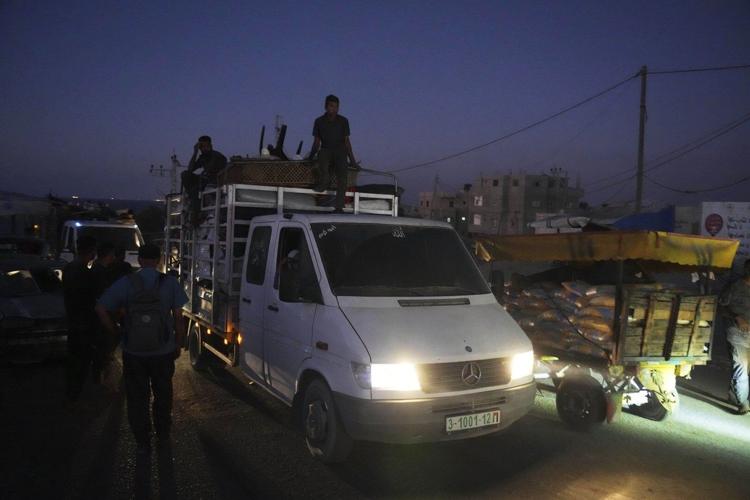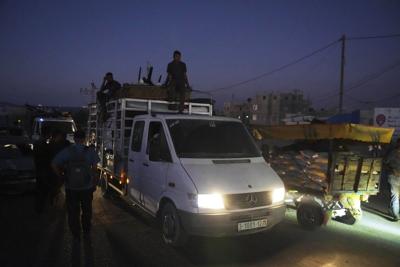KHAN YOUNIS, Gaza Strip (AP) ŌĆö Exhaustion, despair and anger are grinding away at Ne’man Abu Jarad. Once again, for the 11th time, he and his family have been forced to uproot and move across the Gaza Strip.
ŌĆ£ItŌĆÖs a renewal of the torture. WeŌĆÖre not being displaced, weŌĆÖre dying,ŌĆØ Ne’man said last week as the family packed up their possessions and tents in Gaza City to escape escalating Israel bombardment .
The next day, they unpacked in southern Gaza on barren former agricultural land outside the city of Khan Younis, unsure where they would now find food and water.
This has been the , since fleeing their home in the far north of Gaza days after in response to HamasŌĆÖ Oct. 7, 2023, attack. Like countless Palestinian families, they have fled the length of Gaza and back, forced to move every few months as Israel attacks each new shelter. The Associated Press has chronicled much of their journey.
During the ceasefire that began in January, they had to their . But within two months, , and the Abu Jarads .
With each move, Ne’man and his wife Majida try to preserve and their 2-year-old granddaughter amid the misery of tent life. The youngest is 8-year-old Lana; the eldest is Balsam, in her 20s and married.
But the sense of futility is weighing heavier. No end is in sight and Ne’man fears it will get worse.
ŌĆ£WhatŌĆÖs coming is dark,ŌĆØ he said. ŌĆ£We might be expelled (from Gaza). We might die ŌĆ” You feel like death is surrounding you. We just scurry from place to place, away from death.ŌĆØ
Uprooted yet again
ŌĆ£It gets worse for the girls. ItŌĆÖs hard on them to change every time they get used to something,ŌĆØ Majida said.
Since May, the familyŌĆÖs refuge had been a tent in Gaza City. It wasnŌĆÖt easy, but at least they got to know the neighborhood and their neighbors and figured out where to get water and medical care.
Their daughters could see friends from before the war, who were also displaced nearby. Another family in a neighboring building let their daughter Sarah come use their internet to study for online high school classes. The girls downloaded books onto their phones, to study or just to have something to do.
Food was more difficult, as Israeli restrictions on aid . Ne’man joined hundreds of others waiting for aid trucks to enter from Israel. It was dangerous ŌĆō Israeli troops regularly opened fire toward the crowds, and Ne’man saw people getting killed and wounded, Majida said. But he sometimes came back with food.
A few weeks ago, they found a school for Lana. ŌĆ£She was very excited. Her life would have some regularity,ŌĆØ Majida said.
But Israel had ordered the population to evacuate, preparing a new assault to seize Gaza City that it said aims to dismantle Hamas, free hostages and move towards taking security control of the strip. Bombardment came closer. One strike leveled an apartment tower a block away, sending shrapnel that pierced the Abu JaradsŌĆÖ tent. Another destroyed a house across the street, killing members of the family sitting outside, Ne’man said.
Lana had only attended three days of classes. But it was time to go. Last Thursday, they joined a growing exodus of Palestinians fleeing south.
Stress tears at the family
Dressed in pink pajamas and leaning against her father in their new camp the next day, Lana described her best friends Sila and Joudi bidding her farewell as they left Gaza City. They hugged her and told her they loved her ŌĆö and they were crying, Lana said.
ŌĆ£But I did not cry,” she added firmly. “I will not cry at all. I wonŌĆÖt be sad.ŌĆØ
Majida and Ne’man worry about Lana. Their other daughters had a grounding of normal lives. But Lana was only six when IsraelŌĆÖs campaign overturned their lives.
ŌĆ£She is gaining awareness in the middle of war, bombardment and life in the tents,ŌĆØ Majida said.
Lana can be stubborn and impatient.
ŌĆ£ThereŌĆÖs things my sisters put up with that I donŌĆÖt put up with,ŌĆØ Lana said. She canŌĆÖt tolerate the discomforts of tent life. Having to use the makeshift bathroom upsets her. ŌĆ£Sitting and reading, I canŌĆÖt get comfortable,ŌĆØ she said.
Over the months, everything pushes the family to a boil ŌĆö boredom, lack of privacy, the daily toil of lugging water, gathering firewood, searching for food, cleaning the tent. Behind that lie darker thoughts: the feeling this could be their fate forever, the fear a strike could kill them.
Crammed together in the tent, the girls squabble and fight sometimes.
ŌĆ£We were a model family, understanding and loving,ŌĆØ Ne’man said. ŌĆ£I never imagined weŌĆÖd reach this point. I get afraid the family will fragment from all the pressure.ŌĆØ
ŌĆśIn a desertŌĆÖ
The latest move drained what little money they had ŌĆö hundreds of dollars to buy a new tent and rent a truck to carry their belongings.
It also stripped them of everything that made life bearable. The new camp lies in a stretch of barren dirt and fields. ThereŌĆÖs no market nearby, no schools. They have to walk 2 kilometers (1.2 miles) to get an internet connection. They are surrounded by strangers.
ŌĆ£WeŌĆÖre living in a desert,ŌĆØ Ne’man said.
Friday morning, their daughters walked more than a kilometer (half mile) to catch up with a passing water truck. It ran out before they could fill all their plastic jugs.
The family spent the day clearing their spot of land, assembling their two tents ŌĆö one for the family, one for Ne’manŌĆÖs sister. As they worked, an Israeli strike rang out in the distance. They watched the black smoke rise over Khan Younis. Exhausted by the end of the day, Ne’man still had to dig a latrine and set up the bathroom.
The area had been a closed Israeli military zone until a few weeks ago, when Israel announced displaced could move there. An Israeli military position is not far away. They can see tanks moving in and out.
ŌĆ£ItŌĆÖs not safe here,ŌĆØ Ne’man said.
Majida tried to focus on practicalities.
If someday water trucks start coming closer, she said, the girls wonŌĆÖt have to walk as far and will grumble less. Once they set aside a corner for a kitchen, where they can cook and do washing, that will start creating a daily routine.
ŌĆ£The more details of daily life that are in place, the more comfortable we will feel,ŌĆØ Majida said.
ŌĆ£Things will get better,ŌĆØ she said again and again, without a trace of optimism in her voice.
They may have to move again
Four days later, on Tuesday, a voice message from Ne’man came to the AP.
ŌĆ£WeŌĆÖre sitting here unable to eat,ŌĆØ he said. They have almost no money to buy food. No aid is reaching them.
Worse, a man claiming to be the owner of the land had come, backed by armed men, and demanded they pay rent or leave. Ne’man canŌĆÖt afford rent. He canŌĆÖt afford the costs of moving, but may have no choice.
ŌĆ£Soon weŌĆÖll die of starvation,ŌĆØ he said. ŌĆ£Two years, all our energy has been drained, physically, mentally, financially. We canŌĆÖt bear more than this.ŌĆØ
___
Keath reported from Cairo.


























